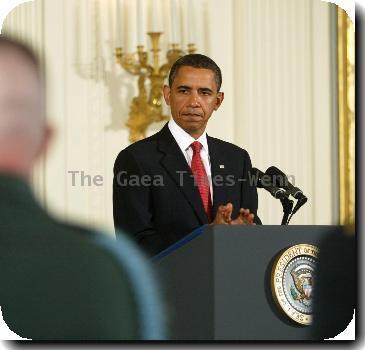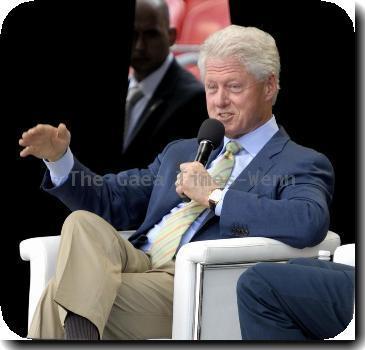THE INFLUENCE GAME: Toyota has friends in high places in Washington, but are they enough?
By Sharon Theimer, APMonday, February 8, 2010
THE INFLUENCE GAME: Toyota’s powerful DC friends
WASHINGTON — The lawmakers now investigating Toyota’s recall include a senator who was so eager to lure the Japanese automaker to his state that he tramped along through fields as its executives scouted plant sites, and a congresswoman who owes much of her wealth to a Toyota supplier.
They and others on the congressional committees investigating Toyota’s massive recall represent states where Toyota has factories and the coveted well-paying manufacturing jobs they bring. Some members of Congress have been such cheerleaders for Toyota that the public may wonder how they can act objectively as government watchdogs for auto safety and oversight. The company’s executives include a former employee of the federal agency that is supposed to oversee the automaker.
Toyota has sought to sow good will and win allies with lobbying, charitable giving, racing in the American-as-apple pie NASCAR series and, perhaps most important, creating jobs. Will those connections pay off as it tries to minimize fallout from its problems?
The Senate’s lead Toyota investigator, West Virginia Democrat Jay Rockefeller, credits himself with lobbying Toyota to build a factory in his state. A member of a House investigating panel, California Rep. Jane Harman, represents the district of Toyota’s U.S. headquarters and has financial ties to the company.
Rockefeller, chairman of the Senate Commerce, Science and Transportation Committee, has known Toyota’s founding family since the 1960s. He was so closely involved with Toyota’s selection of Buffalo, W.Va., for a factory that he slogged through cornfields with Toyota executives scouting locations and still mentions his role in the 1990s deal to this day.
“By the time Toyota decided to make Buffalo its new home,” Rockefeller said in 2006 during the plant’s 10th anniversary, “I felt like a full-fledged member of that site selection team.”
Rockefeller’s committee is expected to review whether the National Highway Traffic Safety Administration acted aggressively enough toward Toyota. The agency’s new chief, David L. Strickland, worked for eight years on Rockefeller’s committee as a lawyer and senior staffer.
Strickland has such close relationships with Rockefeller and other senators that Republican Sen. George LeMieux of Florida asked Strickland at his confirmation hearing two months ago whether he could disagree with Rockefeller, his former boss: “The oversight for you in your role will be from the committee that you once served on,” LeMieux told him.
“I will be honest with you, sir,” Strickland answered. “I’ve had disagreements with the chairman personally. But he signs the paycheck, and he wins. But I will have no problem with that all, sir.”
Rockefeller sees no reason to step aside from his committee’s investigation. Consumer protection is a cornerstone of his work as chairman and that is reflected in the steps he and the committee are taking, including NHTSA briefings and plans to hold hearings and seek recall-related documents, Rockefeller spokeswoman Jamie Smith said.
“While this important work proceeds, Sen. Rockefeller is encouraged that Toyota is making every effort to minimize the impact on its U.S. work force, especially during these difficult economic times,” Smith said. “He hopes and expects that Toyota will remain a strong company and is capable of getting back on the right track with safety and consumer confidence.”
LeMieux on Monday asked Rockefeller to hold a hearing promptly.
“This is a matter of public safety,” LeMieux wrote. “There is a lot of missing information right now about who knew what and when and we ought to expose that information to the public.” Rockefeller’s office had not seen LeMieux’s letter as of late Monday afternoon, Smith said, adding that details on hearings will be announced soon.
Toyota’s U.S. operations are based in Torrance, Calif., in Harman’s district. She serves on the House Energy and Commerce Committee, which is investigating Toyota’s recall.
Harman and her husband, Sidney, held at least $115,000 in Toyota stock as of her most recent financial disclosure report. The company to which the couple owes much of their multimillion-dollar fortune, Harman International Industries, founded by Sidney Harman, sells vehicle audio and entertainment systems to Toyota. The two companies teamed up on a charitable education project in 2003, when Sidney Harman was Harman International’s executive chairman. He retired from the Harman board in December 2008.
When leading Toyota engineer David Hermance died in a 2006 plane crash in California, Rep. Harman took to the floor to pay tribute, calling Hermance the “Father of the American Prius.”
“It was David’s passionate approach and commitment to the environment that helped persuade a skeptical industry and auto-buying public to appreciate the enormous potential of his work,” Harman said at the time. “In fact, Madam Speaker, my family drives two hybrid vehicles — one in California and the other in Washington, D.C.”
Harman didn’t respond to The Associated Press’ request for comment.
Several other lawmakers on investigating committees also represent states with Toyota factories, including Missouri, Texas, Mississippi, Michigan, Indiana and Kentucky. Toyota says it employs nearly 36,000 people in the U.S. and indirectly employs about 166,000 people at dealerships and suppliers.
Republicans also have spoken of Toyota’s importance to their states. “Kentucky is still reaping the rewards of its 20-year partnership with Toyota, and we hope to continue to do so for years to come,” Senate Republican leader Mitch McConnell of Kentucky said in marking the 2006 anniversary of a Toyota plant there.
Still, Toyota has a long way to go to win the wholesale affection of Congress. Democrats criticize it for nonunion shops. Some lawmakers suggest it benefits from unfair Japanese trade policies at the expense of automakers they consider American, such as Ford and General Motors.
Toyota has tried hard to be thought of as an American brand. Its efforts include trying to become part of the nation’s car culture.
In recent years it broke into the highest ranks of the beloved U.S. sport of auto racing, fielding cars in NASCAR races in front of millions of die-hard fans. Popular driver Rusty Wallace announced in November that his team would race in Toyotas starting with the 2010 season.
Its U.S. charity doles out millions each year, sometimes in photo opportunities with politicians. It gave $5.6 million to charitable causes from mid-2007 to mid-2008, much of it focused on education and the environment, according to its most recent report. Toyota promised former President Bill Clinton’s charity that it would spend $496,000 to sustain forests in the southern United States.
“Words cannot express the generosity that Toyota has shown Kentucky through industry job opportunities and community service,” Sen. Jim Bunning, R-Ky., said in a 2006 Senate speech.
Toyota’s lobbying spending in Washington has risen as its U.S. sales have. Toyota spent $5 million last year lobbying on such issues as industry regulation, energy, labor laws, patents, trade, taxes and government contracting. That’s more than five times what it spent a decade earlier, when one of its lobbying reports acknowledged that its mission included “reducing unnecessary regulations.” It is active in several trade associations that lobby, including the National Association of Manufacturers.
Its Washington team is well connected.
Its main liaison to the federal government on vehicle safety issues is Christopher Tinto, who worked for several years in NHTSA’s Office of Defects Investigation as a vehicle defect investigator and in its Office of Vehicle Safety Standards, where he mostly worked on heavy-truck braking standards.
Among its lobbyists is Josephine Cooper, who was chief executive of the Alliance of Automobile Manufacturers, an industry coalition to which Toyota belongs, and who also worked at the Environmental Protection Agency and as an aide to former Vice President Dick Cheney when he was in Congress.
Its lobbyists also include Tom Lehner, who was an aide to five senators and was the Democratic Senatorial Campaign Committee’s treasurer. Another lobbyist, Robert Chiappetta, organizes an annual event in which Toyota sends employees to Washington to lobby Congress and he was a delegate for then-presidential candidate Barack Obama at the 2008 Virginia Democratic Party Convention.Toyota recently retained Quinn Gillespie & Associates, a well-connected, bipartisan lobbying and public affairs firm that will help Toyota try to contain the damage in Washington, the AP has learned. On its Web site, the firm promises to “limit damage to reputation.” The AP also has learned that Toyota has retained The Glover Park Group, a Democratic public affairs-lobbying firm, for crisis management.
Toyota has a diversity advisory board that includes Federico Pena, a Clinton administration Cabinet secretary, national co-chairman of Obama’s presidential campaign and a member of Obama’s transition team; Clinton administration Labor Secretary Alexis Herman; former Republican Rep. Susan Molinari, now a lobbyist working with former New York Mayor Rudy Giuliani; and Gilbert Casellas, former chairman of the U.S. Equal Employment Opportunity Commission, former general counsel of the Air Force and former co-chairman of the U.S. Census Monitoring Board.
One of Toyota’s executives, Tom Stricker, serves on the EPA’s Clean Air Act Advisory Committee, and a former executive, Thomas Zawacki, is commissioner of Kentucky’s Vehicle Regulation Department.
Toyota also is a federal contractor. Its contracts in the 2008 budget year included at least $3.8 million in business providing the State Department with motor vehicles and trailers, according to figures compiled by OMB Watch, a nonpartisan group that tracks government spending.
Toyota has not been a big player in U.S. campaigns. Its U.S. employees contributed roughly $30,000 to federal candidates in 2007-08, compared with about $880,000 from Ford Motor Co. employees and about $799,000 from GM workers.
Unlike rivals Ford and GM, Toyota doesn’t have a political action committee to dole out campaign contributions. Toyota’s PAC would have difficulty distinguishing itself from Toyota’s Japanese management to the degree needed to be legal under U.S. campaign finance laws.
That makes Toyota an unwitting example of an issue that has become a hot topic in Washington in recent days: foreign companies with U.S. subsidiaries and their involvement in U.S. elections. The Supreme Court ruled last month that U.S. corporations and unions can spend treasury money on election ads attacking federal candidates. Some Democrats including President Obama argue the ruling would let foreign corporations with U.S. subsidiaries sneak into U.S. election activities, and they plan legislation to close such a loophole.
Associated Press writers Ted Bridis, Alan Fram and Ken Thomas contributed to this report.
Tags: Automobile Racing, Barack Obama, Bill Clinton, Buffalo, California, District Of Columbia, Geography, Government Regulations, Industry Regulation, Kentucky, Lobbying, New York, North America, Political Issues, Political Organizations, Sports, Sports Names, United States, Washington








